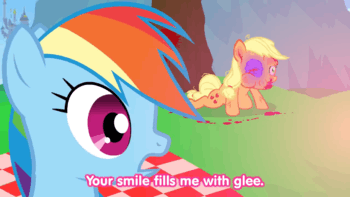Soundtrack Dissonance
"This is so romantic. Love to take my girlfriend on a gondola ride to this."
So you're a big-time Hollywood director. Congrats on that, by the way. You've got a dynamite action movie you're about to start shooting. It won't win you an Oscar, but hey, you've got two of those, and any way, your mortgage payments are becoming somewhat uncomfortable. There's just one problem: the movie is supposed to end with a bloody firefight, and your stupid conscience is acting up again. You went to the NYU film school, dammit, you can't just have 13 minutes of blood and bullets.
But wait. What if you overlay the horrific carnage with beautiful music? Then, you're not indulging your audience's bloodlust, you're making a deep philosophical point about the duality of human nature. What says, "Mankind is both glorious and murderous" better than a faceless mook getting shot in the head at close range while Schubert's "Ave Maria" plays in the background?
Soundtrack Dissonance is utilized to, in literary terms, pose a juxtaposition with the intent of making a thematic statement and/or widening our emotional distance to the events before us, thus allowing us to view the piece in a more removed, intellectual manner.
You're taking advantage of a tactic used countless times over the years to heighten the sadness of a scene. Your dissonant music doesn't have to be played over a violent scene, of course. Happy, upbeat music at a funeral of a beloved character can also work. It can be used to excellent effect, especially if the song is somewhat silly, but if you use "What a Wonderful World" or "You Are My Sunshine" be warned, examples of those have their own pages now.
Of course, it can work both ways as well. Inappropriate music can be often played for laughs; a sombre, portentious and important-sounding piece of music played over something utterly trivial happening on screen can increase the laughter. Similarly, a light and cheery pop song or sweet love ballad playing over an otherwise tense scene can be played for laughter, especially if the tension comes from something absurd that the characters are otherwise treating entirely seriously. But if you use "Yakety Sax", be warned...
The Ode To Joy choral in the fourth movement of Beethoven's Symphony No. 9 is especially cursed to suffer from Soundtrack Dissonance due to its notorious use in Third Reich propaganda, hence modern usage is just as often due to this association (or to the most well-known work to use it for Soundtrack Dissonance, A Clockwork Orange) as it is its original intent (to be absolutely clear, Friedrich von Schiller's original lyrics were about the equality and brotherhood of all humankind.).
Pretty much any anime with a happy Ending Theme will achieve this trope with its first serious Cliff Hanger, intentionally or otherwise. Same for a happy Opening Theme and any stressful teaser.
The entire process has been streamlined by the ability of some video game consoles to replace a game's soundtrack with anything the player cares to play. Try setting the most violent, obscene parts of Gears of War to "Yakety Sax" sometime; your parents will search your mattress for drugs, but you'll be enriched by the experience. Unless, you know, you actually have drugs stashed in your mattress.
If a character is singing their favourite lullaby or nursery song, it's an Ironic Nursery Tune, if it involves young children singing nursery rhymes in the background it's Creepy Children Singing.
When this trope is done poorly it can easily turn a dramatic scene into Narm.
A common sister trope is is using dramatic music to mundane events (Mundane Made Awesome)
A subtrope of Mood Dissonance. Compare Lyrical Dissonance and Hypocritical Singing. Contrast Suspiciously Apropos Music.
Many of these musical pieces are Standard Snippets.
In film school this trope is called Counterpoint.
- What a Wonderful World
- Yakety Sax
- You Are My Sunshine
- Anime
- Film
- Live Action TV
- Musical
- Video Games
- Western Animation
- Other Media
- This is a meme. No seriously.
